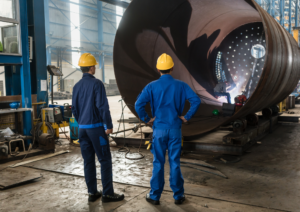In the global fight against climate change, the paramount objective of decarbonization has emerged, uniting governments, industries, and individuals. It involves the reduction of carbon emissions to mitigate the far-reaching effects of global warming and transition to a cleaner and more sustainable energy ecosystem. Within this transformative endeavor, artificial intelligence (AI) has taken center stage, assuming a progressively prominent role. AI technology is not only contributing to efficiency improvements and resource optimization but also providing innovative solutions for decarbonization across a multitude of sectors.
The potential economic benefits of AI-powered decarbonization solutions are substantial. For instance, a study conducted by PwC UK indicated that AI has the capacity to reduce global greenhouse gas emissions by 4% by 2030 and generate economic benefits up to $5.2 trillion. Numerous avenues exist for AI’s contribution to the decarbonization of the energy sector. Here are a few illustrative examples:
- Optimizing Renewable Energy Generation and Consumption: AI can be harnessed to enhance the operation of renewable energy systems, such as solar and wind farms. AI algorithms, for instance, can predict weather patterns and energy demand, adjusting the output of renewable energy systems accordingly. This optimization ensures the efficient use of renewable energy sources and enhances the grid’s capacity to manage the variability of renewable energy generation.
- Improving Energy Efficiency: AI plays a pivotal role in enhancing the energy efficiency of various entities, including buildings, homes, and industrial processes. AI-driven thermostats, for instance, can learn household heating and cooling preferences and adjust temperatures, conserving energy. In industrial settings, AI optimizes processes, resulting in reduced energy consumption.
- Developing New Decarbonization Technologies: AI is instrumental in the development of innovative decarbonization technologies such as carbon capture and storage (CCS) and direct air capture (DAC). These technologies capture carbon dioxide emissions from industrial facilities, either storing them underground or repurposing them for other applications.
Supporting data reinforces the considerable impact of AI technology on sustainability and decarbonization objectives. For instance, a study by the National Renewable Energy Laboratory (NREL) found that AI-based forecasting models can enhance wind energy output predictions by up to 15%, vital for grid integration and decreasing reliance on fossil fuels as backup power sources.
Furthermore, AI has led to substantial improvements in energy efficiency. According to Deloitte, commercial buildings have the potential to reduce energy costs by up to 40% by employing IoT-based energy consumption monitoring and AI-driven solutions, identifying and rectifying energy inefficiencies.
In the transportation industry, the adoption of autonomous vehicles stands as an agreement to AI’s emissions-reduction potential, with a recent study suggesting a potential 20% reduction in fuel consumption and emissions. AI’s transformative impact is also evident in carbon capture and utilization. The Global CO2 Initiative’s report highlights AI’s role in improving capture efficiency by up to 50%, with the potential to capture substantial amounts of CO2 annually.
In agriculture, AI-supported precision farming, championed by the Food and Agriculture Organization (FAO), plays a pivotal role in reducing emissions. Precision agriculture practices have the potential to reduce fertilizer use by 10-15%, leading to lower emissions associated with fertilizer production and application.
Moreover, AI-driven carbon pricing models have the potential to drive emissions reductions by optimizing markets. Research from the World Resources Institute (WRI) suggests that well-designed carbon pricing mechanisms could yield emissions reductions ranging from 20% to 25% by 2030.
While AI holds immense potential for decarbonizing the energy sector, it is not without its challenges. Developing and deploying complex AI algorithms can be costly and demanding. Additionally, AI systems can be vulnerable to cyberattacks. Nevertheless, the opportunities for leveraging AI in the pursuit of decarbonization are vast. By harnessing AI technologies, we can build a more sustainable and resilient energy future.
In conclusion, decarbonization is a global imperative, and AI technology is at the forefront of this critical mission. With its capacity to optimize renewable energy, enhance energy efficiency, revolutionize transportation, and transform multiple sectors, AI is providing innovative solutions for reducing carbon emissions. The supporting data underscores the tangible impact of AI on decarbonization, highlighting the potential for a more sustainable and environmentally friendly future. The collaboration between AI technology and decarbonization offers a promising pathway in the ongoing battle against climate change, securing a cleaner and greener planet for future generations.





